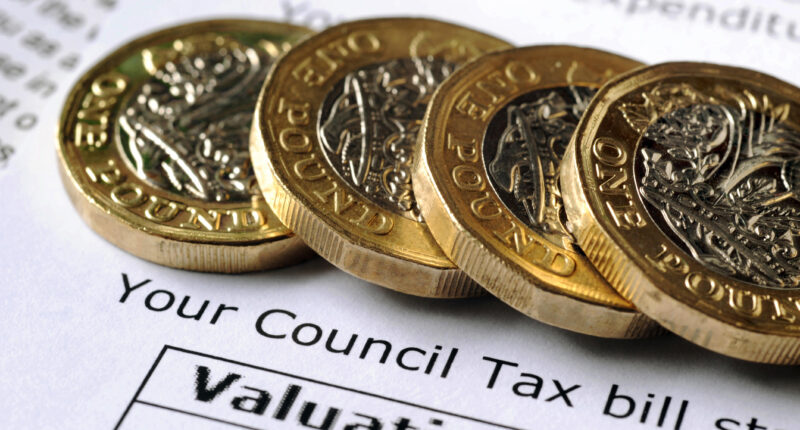THE DWP has revealed a list of benefits that WON’T receive the first instalment of the cost of living payment from next week.
Struggling households on specific benefits including Universal Credit will be handed £900 in total, with the first payments hitting bank accounts from April 25 to May 17.
However, there are a some who won’t qualify for the help, including those who receive Attendance Allowance, Carer’s Allowance, Child Benefit and Disability Living Allowance.
Other benefits include contributory Employment and Support Allowance (ESA), Guardian’s allowance, Contribution-based, or “new style”, Jobseeker’s Allowance (JSA), Maternity Allowance, Personal Independence Payment, State Pension, Statutory Adoption, Maternity, Paternity and Shared Parental Pay, as well as Statutory Sick Pay.
You will only be able to access the free cash if you’re in receipt of at least one of the following benefits: Income-based Jobseeker’s Allowance, Income-related Employment and Support Allowance, Income Support, Pension credit, Child tax credit, Working tax credit and Universal Credit.
Read our Cost of Living blog below for the latest updates…
-
Here’s how to avoid supermarkets tricks
Money-saving expert and director of online supermarket Britsuperstore Richard Price has given his top tips on what to look out for at the supermarkets and how to avoid spending extra.
Over the years supermarket trolleys have grown in size!
The larger the cart, the more likely you’ll end up spending more, so try to stick to a handbasket instead. Research found that when the size of the cart doubled, consumers bought 40% more.
-
Urgent bill warning for millions of households that could cost you thousands
There is one payment in particular that you should avoid falling behind on – as you could be asked to pay thousands of pounds upfront.
Council tax is one of the biggest bills Brits fork out cash on – and one we struggle the most to pay.
Richard Lane, director of external affairs at StepChange, said: “Council tax debt is a common problem among new StepChange clients – last year over a third (36%) of clients were in arrears.
“Council tax debt is often escalated to enforcement agents, commonly known as bailiffs, often without enough consideration of whether this is appropriate for people who actually need help with their debts.”
If you fall behind you could be asked to pay the entire outstanding balance at once upfront.
Find out more – including what help is on offer here.
-
What to do about a billing error
If you think you’ve been billed in error you can complain to your supplier.
It’s best to tackle the issue straight away, otherwise it can snowball and get even more expensive and complicated.
Anything from account mix-ups, faulty meters and IT errors could mean you’re being overcharged.
You’re protected by backbilling rules, so you can’t be charged for gas or electricity used more than 12 months ago.
Similar to financial services firms, energy companies have to have a complaints procedure for customers to follow.
You should first complain to your energy provider.
Simply explain what the problem is and what you want your supplier to do about it – check your energy supplier’s website for an explanation of how to launch a complaint.
Energy suppliers have up to eight weeks to come to tell you their decision on the complaint.
If you can’t reach an agreement with your supplier after eight weeks, you can ask for a “deadlock letter”, which enables you to take your case to the free Energy Ombudsman.
-
Energy customers furious after being hit with shock bills for hundreds of pounds after glitch
Energy customers have been left furious after a meter glitch at Boost- part of Ovo Energy – has landed some households on prepayment meters with debts of as much as £700.
Affected customers have received emails and letters from the energy firm which supplies around 200,000 homes, telling them they must pay back the cash after being incorrectly charged.
The message said: “Unfortunately, when our prices went up in October, your meter wasn’t updated due to a technical problem.
“This means that we were charging you less than we should have for a short period of time. We’re sorry about this.
“You’ll need to pay the difference in price for energy you’ve used. But we’re reducing this amount by 10% to say sorry for the mistake.”
Ovo Energy has not said how many people are affected but has confirmed which customers are being asked to repay the money.
Find out more here.
-
How much can I borrow for my mortgage?
Most mortgage calculators calculate how much you can expect to borrow from the bank.
However, these are just an estimate, the actual amount will depend on the lender and circumstances.
Bear in mind that while house prices have dropped for several consecutive months, lenders are short and interest rates have increased.
Rising rates and the cost of living crisis have meant fewer people are looking to buy a home or move home – badly impacting the housing market.
-
Are you eligible for benefits?
A number of charities have benefits calculators that you can use to work out if you are entitled to any extra help.
This includes:
- Turn2Us
- Policy in Practice
- EntitledTo
It’s worth looking into, as if you do qualify, it could make you eligible for the £900 cost of living payment too.
-
What temperature to run your washing machine at to save money
To save on your energy bills, experts suggest lowering the temperature at which you wash clothes.
You’ll still be getting fresh and clean clothes if you switch from a 40C wash to a 30C one and it could save you £12 a year on average, according to Energy Saving Trust.
If you use your washing machine a lot, you’ll save even more if you lower the temperature.
Uswitch energy expert Will Owen previously told The Sun: “Use a cold water or 30C cycle where possible. It’s only for particularly dirty clothes, bad stains or underwear that you are likely to need warmer temperatures.”
-
DWP issues Pension Credit reminder
Those eligible for Pension credit could be on average £3,500 a year better off, the DWP has revealed.
Taking to Twitter, The Department for Work and Pensions (DWP) reminded followers that they could be missing out on the cash and additional cost of living payments.
Find out more below.
-
The clever travel trick to grab a holiday bargain as airfares rise
Holiday makers can grab a bargain this summer thanks to a brand-new feature introduced by flight comparison website Skyscanner.
With airfares on the rise, many are looking to find creative and reliable ways to cut back on flight prices and save some much needed cash.
Dubbed the ‘savings generator’, the new tool is designed to help travellers nab the cheapest flights.
As reported by Conde Nast Traveller, the feature helps customers identify the best times to book a flight as well as the best day to fly.
Jemma Porter of Skyscanner said: “According to our research, 19 per cent of people think that the cost of flights is the most important consideration when booking a trip.
“So, we’re putting our data to good use by helping you find the best time to book.”
Credit: Getty
-
DWP reveals list of benefits that WON’T receive £301 cash
The DWP has revealed a list of benefits that WON’T receive the first instalment of the cost of living payment from next week.
Struggling households on specific benefits including Universal Credit will be handed £900 in total, with the first payments hitting bank accounts from April 25 to May 17.
However, there are a some who won’t qualify for the help, including those who receive Attendance Allowance, Carer’s Allowance, Child Benefit and Disability Living Allowance.
Other benefits include contributory Employment and Support Allowance (ESA), Guardian’s allowance, Contribution-based, or “new style”, Jobseeker’s Allowance (JSA), Maternity Allowance, Personal Independence Payment, State Pension, Statutory Adoption, Maternity, Paternity and Shared Parental Pay, as well as Statutory Sick Pay.
You will only be able to access the free cash if you’re in receipt of at least one of the following benefits: Income-based Jobseeker’s Allowance, Income-related Employment and Support Allowance, Income Support, Pension credit, Child tax credit, Working tax credit and Universal Credit.
-
How EE, Three, O2 and Vodafone customers can save up to £200 a year
Millions of customers that are currently registered with EE, Three, O2 and Vodafone can save up to £200 a year by switching to a cheaper deal.
Consumer group Which? suggested that customers should change their contract when it ends.
It found that EE customers who deal has ended pay on average £23.80 a month and if they switch to Smarty’s 4GB offer which costs £18.80 a month, they can save up to £225.60 a year.
Meanwhile, Vodafone customers that pay around £22.20 a month can save up to £206.40.
Be aware that not everyone can simply just make the switch now, because millions might be trapped in a fixed-term contract.
Rocio Concha, Which? director of policy and advocacy, said: “Anyone not in contract should be thinking about making a switch or at least haggling for a much better deal from their current provider.”
-
Cost of living latest news:
-
How much can I borrow for my mortgage?
Most mortgage calculators calculate how much you can expect to borrow from the bank.
However, these are just an estimate, the actual amount will depend on the lender and circumstances.
Bear in mind that while house prices have dropped for several consecutive months, lenders are short and interest rates have increased.
Rising rates and the cost of living crisis have meant fewer people are looking to buy a home or move home – badly impacting the housing market.
-
11 ways to get interest-free or cheap loans if you’re struggling
There is help available for struggling households hit with surprise costs.
A rainy-day savings pot is the ideal way to cover an unexpected hit – but a stash of surplus cash during the cost of living crisis is a tough ask for many.
You should always check you are getting all the help you are entitled to before turning to borrowing.
However, if other options have been exhausted, it’s important to consider the best and cheapest way of taking on debt.
Here we outline some of the options that could be available to you.
- Interest-free loans for food
- Money from your job
- Free overdraft
- Interest-free purchases
- Buy now pay later
- Interest-free credit cards
- Interest-free help with mortgage repayments
- Universal Credit Budgeting Advances
- Budgeting Loans
- Credit union loans
- Interest-free local council loans
Find out more about each of the above loans here.
-
Other payments in May
You should expect to see the first chunk of the £900 cost of living payment land in accounts between April 25 and May 17.
It’s £301 and it’s for households receiving certain benefits, including Universal Credit.
The payments are part of a package of wider Government support announced to tackle the cost of living.
It includes a further £300 payment for eligible families in autumn, and then a payment of £299 in spring 2024.
There will also be a £150 cost of living payment for eligible people with certain disabilities.
Millions are also in line for a separate £150 payment into their bank account to help with the rising cost of energy bills.
Around four in five households in England in council tax bands A to D should get the payment.
It’s been dished out since April 1 but many councils have had to wait to process payments, meaning many will come through in May instead.
-
Full list of 12 benefits being paid early next week
Millions of households will see their benefits paid early next week due to an upcoming bank holiday.
Because May 1 is a bank holiday, it’s confirmed those who are due their benefit on the first will receive theirs on April 28 instead.
This counts for any of the following 12 benefits:
-
Why has your Universal Credit payment stopped?
Failing to report a change in your circumstances can lead to your Universal Credit payments being halted.
This includes a new mobile number or email, a new job or house and a change in your savings.
But there are other scenarios where this might happen to you. This includes:
- not applying or looking for work
- refusing a job offer
- quitting your job without a good reason
- being late to appointments and interviews
- not taking a job in a different sector
You can appeal a sanction if you think you’ve been treated unfairly by the DWP by asking for a “mandatory reconsideration.”
-
Five top tips to avoid wasting diesel and petrol while driving
With the cost of living crisis continuing to take a toll, the increased cost of fuel is a concern for most drivers.
Handily, insurance experts at A-Plan Insurance have rounded up five tips to help motorists avoid wasting fuel unnecessarily while driving.
- Watch your speed
- Watch your gears
- Remove weight and reduce drag
- Maintain your tyres
- Avoid travel hotspots
You can find more details on each of the above top tips here.
-
How much does it cost to take a shower?
Research from Uswitch shows taking a 10-minute shower uses 1.42kWh of electricity, costing someone on a standard variable tariff around 48p a go.
If you did this every day it would cost you £175.20 a year.
That’s based on an 8.5KW electric shower and a unit rate of 34p.
However, this amount may be different if you are on an Economy 7 tariff.
With this, it will be cheaper to shower in the evenings.
Under the current price cap, it will cost you 37p to use an 8.5 kilowatt shower for 10 minutes at night.
But it will cost you 56p on a day rate and using the same power shower head for 10 minutes.
Ben Gallizzi, an energy expert at Uswitch, said: “People on Economy 7 will likely be paying more to shower during the day than those on standard tariffs with rates capped by the energy price guarantee, but night-time costs are lower.
“However, usually people with Economy 7 tariffs will pay their cheaper rates between midnight and 7am — so if you are an early riser, you may benefit from cheaper rates by taking an early morning shower rather than needing to have one in the middle of the night.”
-
Key dates to look out for in May
Households receiving tax credits will receive their first payment from Tuesday, May 2.
The £301 payment will be paid automatically into bank accounts from this date up to May 9.
Only eligible families who receive tax credits and no other means-tested benefits will receive the payment from HMRC.
The payment will show as “HMRC COLS” in bank and building society accounts, so that they know the money is cost-of-living support.
To be eligible, households must have received a payment of tax credits between January 26 to February 25 2023.
If you qualify, you don’t need to apply or contact HMRC to receive the payment.
The payment to people on tax credits comes a week after those who get it via the DWP to avoid duplicate payments.
-
What is Universal Credit?
Universal Credit is a welfare scheme that was designed to combine a number of old “legacy benefits” into a single monthly payment.
Whether you are eligible will depend on your individual circumstances.
You may be eligible if you meet all of the following criteria:
- you’re on a low income or out of work
- you’re 18 or over (there are some exceptions if you’re 16 to 17)
- you’re under State Pension age (or your partner is)
- you and your partner have £16,000 or less in savings between you
- you live in the UK
-
Here’s how to avoid supermarkets tricks
Money-saving expert and director of online supermarket Britsuperstore Richard Price has given his top tips on what to look out for at the supermarkets and how to avoid spending extra.
Over the years supermarket trolleys have grown in size!
The larger the cart, the more likely you’ll end up spending more, so try to stick to a handbasket instead. Research found that when the size of the cart doubled, consumers bought 40% more.
-
Brits can apply for £200 energy help
Brits who purchased alternative sources of fuel to heat their homes before last September can claim £200 in free energy help.
Households who used heating oil, liquefied petroleum gas, coal or biomass to heat their homes can claim the free cash help as part of an expanded government scheme.
To apply, you simply have to have evidence you purchased or used any alternative fuel to heat your home prior to September 2022.
Most eligible Brits would have received the £200 energy bill help automatically but some will still need to apply.
Households who use only alternative fuel must apply for the cash by May 31.
-
Gardening tips to help cut costs
To help you spruce up your beds, patio or lawn for less, we asked Fiona Jenkins at trades matching site, Myjobquote.co.uk, to tell us about her cheap garden hacks.
Shelling out lots for plant pots can be costly, so Fiona recommends getting a bit creative.
“Why not try putting plants in old wellington boots,” she said.
“If you have ones your children have grown out of, these won’t cost you a penny.”
If you are set on purchasing pots, Wilko is a good bet, selling a pack-of-five large easy-release pots for £5.
While you’re there, you could pick up a three-tier planter stand for £25.
“But if you’ve got an old ladder lying around, you could use that instead,” said Fiona.
“Then you won’t have to shell out on a stand from a shop.”
-
Full list of benefits that DON’T qualify for £301 cost of living payment
Millions are set to receive a £301 cost of living payment within weeks, but not everyone will get the cash.
Households on specific benefits including Universal Credit, Pension Credit and Income support will get £900 in total.
However, there are some who won’t be eligible for the help such as those on Guardian’s Allowance and Child Benefit.
We’ve rounded up the full list of benefits that won’t qualify for the £301 one-off cost of living payment.
- Attendance allowance
- Carer’s allowance
- Child benefit
- Disability living allowance (DLA)
- Contributory, or “new style”, employment and support allowance (ESA)
- Guardian’s allowance
- Contribution-based, or “new style”, jobseeker’s allowance (JSA)
- Maternity allowance
- Personal independence payment
- State pension
- Statutory adoption, maternity, paternity and shared parental pay
- Statutory sick pay













